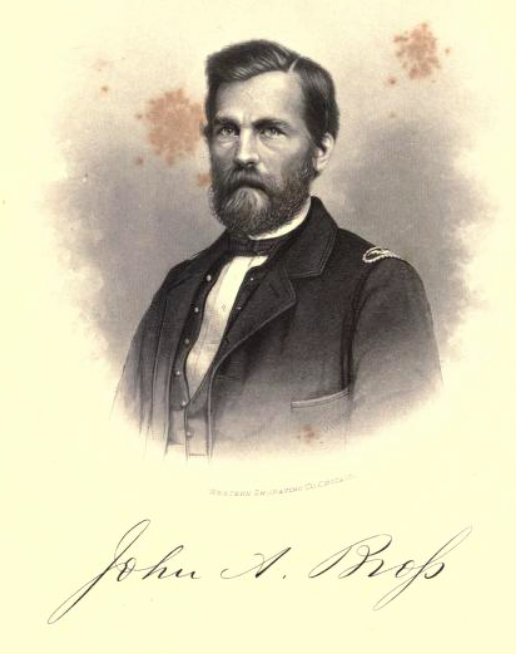
John A. Bross (Memorial, 1865)
John A. Bross (1826-1864)
OFFICE LOCATION: Chicago, IL
TENURE: – 1864
HEARINGS: 1*
RENDITIONS: 0
CASES:
Missouri Fugitives Case (1854) – multiple individuals released
- Slaveholder Richard Berry and three other Missourians journeyed to Chicago with U.S. Marshal Henry Wilton, in pursuit of four fugitives that formed part of a larger group of 17 freedom seekers. After arriving on Thursday, December 7, Berry and his compatriots sought to conceal their intentions, but when word of their search crept out, they grew furious at Wilton, accusing the marshal of betraying them. After considerable difficulty, several fugitives were reportedly apprehended, though accounts conflict over whether a hearing actually took place. The Free West, a Chicago-based anti-slavery serial, seethed that “Commissioner Bross had his rooms swept and garnished for the occasion of a solemn hearing,” but intimated that no such hearing took place. Conversely, the New York Herald reported that Commissioner Bross was “intimidated by the crowd of people” gathered outside his office, and as a result “dismissed the proceedings.” [1854-12-14 Chicago Free West; 1854-12-16 Chicago Weekly Democrat; 1854-12-09 New York Herald; History of Chicago, Illinois (New York: Munsell & Co., 1895), 2:193, WEB]
- The St. Louis Republican expressed its frustration at the “total failure of a recent attempt to execute the Fugitive Slave Law in Chicago, and by the nullification of which law seventeen slaves, belonging to citizens of this county, have been lost to them.” While noting that “we have learned… that the United States Commissioner performed his duty promptly,” the Republican admonished Marshal Wilton. “He was either afraid, or was indifferent to the performance of his sworn duty, for, when one of the slaves was pointed out to him at one of the Hotels, though within reach of him, he refused to take him into custody. He refused, also, to execute the warrants, unless the owners of the slaves should employ one hundred policemen and pay them a dollar an hour.” [1854-12-11 St. Louis Republican]
- Noting the significance of the case, the Free West triumphantly declared: “The thing is demonstrated–no negro can be arrested, much less carried away from Chicago.” [1854-12-14 Chicago Free West]
NOTES:
- Commissioner Bross was the brother of “Deacon” William Bross, editor of the Chicago Democratic Press.
- Bross was appointed during the Pierce administration, serving as U.S. Marshal and U.S. Commissioner. [Memorial of Colonel John A. Bross, Twenty-Ninth U.S. Colored Troops (Chicago: Tribune Book and Job Office, 1865),4 WEB]
- During the 1851 Moses Johnson case, heard by Commissioner George W. Meeker, Bross was listed as one of Meeker’s “special assistants” who escorted the alleged fugitive into the hearing room. [1851-06-14 Washington, D.C. Southern Press]
- During the Civil War, Bross served as lieutenant colonel of the 29th U.S. Colored Troops. He was killed in action during the siege of Petersburg in July 1864. [Edward A. Miller, Jr., The Black Civil War Soldiers of Illinois: The Story of the Twenty-Ninth U.S. Colored Infantry (Columbia, SC: University of South Carolina Press, 1998), 12-13, WEB]